

Jovenel Moïse. Un article de Wikipédia, l'encyclopédie libre.
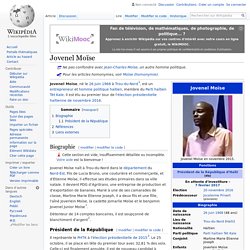
Jovenel Moïse, né le à Trou-du-Nord[1], est un entrepreneur et homme politique haïtien, membre du Parti haïtien Tèt Kale. Il est élu au premier tour de l'élection présidentielle haïtienne de novembre 2016. Biographie[modifier | modifier le code] Détenteur de 14 comptes bancaires, il est soupçonné de blanchiment d'argent[2]. Président de la République[modifier | modifier le code] Il représente le PHTK à l'élection présidentielle de 2015[3]. Contrairement à ce que peut faire croire leurs patronymes, Jovenel Moïse et Jean-Charles Moïse, autre candidat aux élections présidentielles de 2015 et de 2016, n'ont aucun lien de parenté[4].
Avec un taux de participation de moins de 21 %[5], il remporte le scrutin à la majorité absolue dès le premier tour, recueillant 55,67 % des suffrages, devant Jude Célestin (19,52 % des voix), Jean-Charles Moïse (11,04 %) et Maryse Narcisse (8,99 %)[6],[5]. Le , son élection est définitivement validée[7]. Jocelerme Privert - Wikipedia. Jocelerme Privert (French pronunciation: [ʒɔslɛʁm pʁivɛʁ]; born 1 February 1953[1]) is a Haitian accountant, bureaucrat, politician and a former provisional President of Haiti.
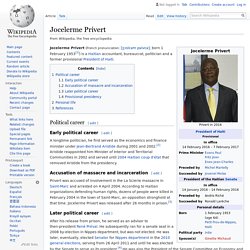
Political career[edit] Early political career[edit] A longtime politician, he first served as the economics and finance minister under Jean-Bertrand Aristide during 2001 and 2002.[2] Aristide reappointed him Minister of Interior and Territorial Communities in 2002 and served until 2004 Haitian coup d'état that removed Aristide from the presidency. Michel Martelly. Michel Joseph Martelly (born 12 February 1961[2]), also known by his stage name "Sweet Micky", is a Haitian politician, former musician and businessman.
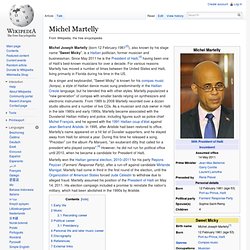
Since May 2011 he is the President of Haiti,[3] having been one of Haiti's best-known musicians for over a decade. For various reasons Martelly has moved a number of times between the United States and Haiti, living primarily in Florida during his time in the US. Boniface Alexandre. Alexandre left office on May 14, 2006, when René Préval, winner of the February 2006 presidential election, was sworn in as president.
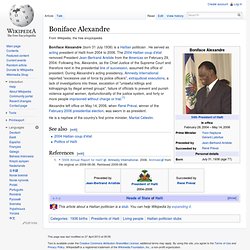
He is a nephew of the country's first prime minister, Martial Célestin. Émile Jonassaint. Émile Jonassaint (May 20, 1913, Port-de-Paix - – October 10, 1995, Port-au-Prince) was a Haïtian Supreme Court Justice and political figure.
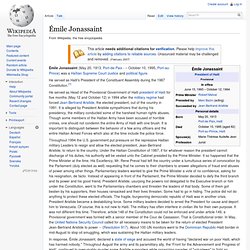
He served as Haiti's President of the Constituent Assembly during the 1987 Constitution.[1] He served as Head of the Provisional Government of Haiti president of Haiti for five months (May 12 and October 12) in 1994 after the military regime had forced Jean-Bertrand Aristide, the elected president, out of the country in 1991. It is alleged by President Aristide sympathizers that during his presidency, the military conducted some of the harshest human rights abuses. Joseph Nérette. Joseph Nérette (April 9, 1924 – April 29, 2007) was a Haïtian judge and political figure.
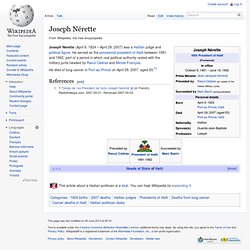
He served as the provisional president of Haïti between 1991 and 1992, part of a period in which real political authority rested with the military junta headed by Raoul Cédras and Michel François. Marc Bazin. Marc Louis Bazin (March 6, 1932 – June 16, 2010) was a World Bank official, former United Nations functionary and Haïtian Minister of Finance and Economy under the dictatorship of Jean-Claude Duvalier.
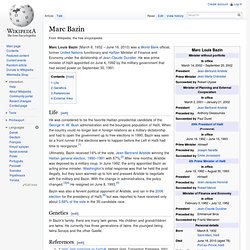
He was prime minister of Haïti appointed on June 4, 1992 by the military government that had seized power on September 30, 1991. René Préval. Jean-Bertrand Aristide. Jean-Bertrand Aristide (born 15 July 1953) is a Haitian former Catholic priest of the Salesian order and politician who served as Haiti's first democratically elected president.[1][2] A proponent of liberation theology,[3][4] Aristide was appointed to a parish in Port-au-Prince in 1982 after completing his studies.
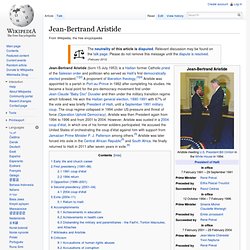
He became a focal point for the pro-democracy movement first under Jean-Claude "Baby Doc" Duvalier and then under the military transition regime which followed. He won the Haitian general election, 1990-1991 with 67% of the vote and was briefly President of Haiti, until a September 1991 military coup. The coup regime collapsed in 1994 under US pressure and threat of force (Operation Uphold Democracy). Aristide was then President again from 1994 to 1996 and from 2001 to 2004. Raoul Cédras. Joseph Raoul Cédras (born Jérémie, Haiti July 9, 1949) is a former military officer, and was de facto ruler of Haiti from 1991 to 1994.
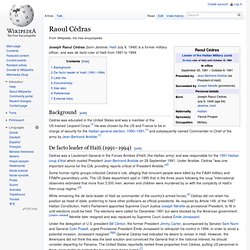
Background[edit] Cédras was educated in the United States and was a member of the US-trained Leopard Corps.[1] He was chosen by the US and France to be in charge of security for the Haitian general election, 1990–1991,[1] and subsequently named Commander-in-Chief of the army by Jean-Bertrand Aristide.[1] De facto leader of Haiti (1991–1994)[edit] Cédras was a Lieutenant General in the Forces Armées d'Haïti (the Haitian army) and was responsible for the 1991 Haitian coup d'état which ousted President Jean-Bertrand Aristide on 29 September 1991.
Hérard Abraham. Hérard Abraham (born July 28, 1940) is a former Haïtian political figure.
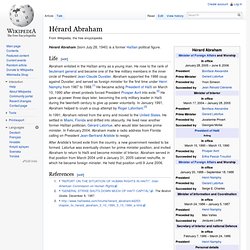
Life[edit] Abraham enlisted in the Haïtian army as a young man. He rose to the rank of lieutenant general and became one of the few military members in the inner circle of President Jean-Claude Duvalier. Henri Namphy. Henri Namphy (born November 2, 1932 in Cap-Haïtien, Haiti) was a Haitian general and political figure who served as President of Haiti's interim ruling body, the National Council of Government, from February 7, 1986 to February 7, 1988.
He served again as President of Haiti from June 20, 1988[1] until his deposition on September 17, 1988 in the September 1988 Haitian coup d'état.[2] Following the fall of the government headed by President-for-Life Jean-Claude Duvalier, who fled the country with his family in 1986, Lieutenant General Namphy became president of the interim governing council, made up of six civilian and military members, which promised elections and democratic reforms. His regime was given the moniker “duvalierism without Duvalier”. Namphy, who enjoyed a reputation for being honest[1] and apolitical, had trouble in his early weeks in power; Haitians ceased their celebrations over the departure of Duvalier and started rioting and looting. Prosper Avril. Matthieu Prosper Avril (born December 12, 1937) is a Haitian political figure who was President of Haiti from 1988 to 1990.
A trusted member of François Duvalier's Presidential Guard and adviser to Jean-Claude Duvalier, Lt. Gen. Avril led the September 1988 Haitian coup d'état against a transition military government installed after Jean-Claude Duvalier's 1986 overthrow. He was President until March 1990, in a period which according to Amnesty International was "marred by serious human rights violations". Ertha Pascal-Trouillot. Ertha Pascal-Trouillot (born 13 August 1943) was the provisional President of Haiti for 11 months in 1990 and 1991. She was the first woman in Haitian history to hold that office. Background[edit] Her father, Thimocles, was an iron worker and died when she was young.
Her mother Louise (née Dumornay) was a seamstress and embroiderer. Henri Namphy. Leslie Manigat. Leslie François Saint Roc Manigat (born August 16, 1930 in Port-au-Prince) was elected president of Haiti by a tightly controlled military held election in January 1988. François Duvalier. François Duvalier (14 April 1907 – 21 April 1971), also known as 'Papa Doc' Duvalier, was the President of Haiti from 1957 until his death in 1971. He opposed a military coup d'état in 1950, and was elected president in 1957 on a populist and black nationalist platform. His rule, based on a purged military, a rural militia known as the Tonton Macoute and the use of a personality cult and voodoo, resulted in the murder of an estimated 30,000 Haitians and the exile of many more.
Ruling as President for Life from 1964 until his death in 1971, Duvalier was initially known for successfully fighting diseases, gaining him the nickname 'Papa Doc' ("Daddy Doc[tor]" in French). Daniel Fignolé. Antonio Thrasybule Kebreau. Jean-Claude Duvalier. Jean-Claude Duvalier, nicknamed "Bébé Doc" or "Baby Doc" (born July 3, 1951) was the President of Haiti from 1971 until his overthrow by a popular uprising in 1986. He succeeded François "Papa Doc" Duvalier, his father, as the ruler of Haiti following the older man's death in 1971. After assuming power, he introduced cosmetic changes to his father's regime and delegated much authority to his advisors, though thousands of Haitians were killed or tortured, and hundreds of thousands fled the country.[1] He maintained a notoriously lavish lifestyle (including a state-sponsored $3 million (USD) wedding in 1980), and made millions from involvement in the drug trade and from selling body parts from dead Haitians while poverty among his people remained the most widespread for any country in the Western Hemisphere.[2] Duvalier unexpectedly returned to Haiti on January 16, 2011 after two decades in self-imposed exile in France.
Early life[edit] Joseph Nemours Pierre-Louis. Franck Sylvain. Dumarsais Estimé. Léon Dumarsais Estimé (21 April 1900 – 20 July 1953) served as the President of Haïti from 16 August 1946 until 10 May 1950. He was the first black head of state since the US occupation of Haiti ended in 1934. Sténio Vincent. Élie Lescot. Antoine Louis Léocardie Élie Lescot (December 9, 1883 – October 20, 1974) was the President of Haiti from May 15, 1941 to January 11, 1946.
He was a member of the country's light-skinned elite and used the political climate of World War II to sustain his power and ties to the United States, Haiti's powerful northern neighbor. His administration presided over a period of economic downturn and harsh political repression of dissidents. Early life[edit] Paul Magloire. Louis Borno. Louis Eugène Roy. Vilbrun Guillaume Sam. Oreste Zamor. Joseph Davilmar Théodore. Philippe Sudré Dartiguenave. Tancrède Auguste. Michel Oreste. Cincinnatus Leconte. Tirésias Simon Sam. Pierre Nord Alexis. François C. Antoine Simon. Monpoint Jeune. Florvil Hyppolite. François Denys Légitime. Joseph Lamothe. Pierre Théoma Boisrond-Canal. Lysius Salomon. Fabre Geffrard. Nissage Saget. Pierre Théoma Boisrond-Canal. Pierre Théoma Boisrond-Canal.
Michel Domingue. Faustin I of Haiti. Jean-Louis Pierrot. Nissage Saget. Jean-Baptiste Riché. Jean-Jacques Dessalines - Wikip?dia. Henri Christophe. Charles Rivière-Hérard. Alexandre Pétion. Jean Pierre Boyer.